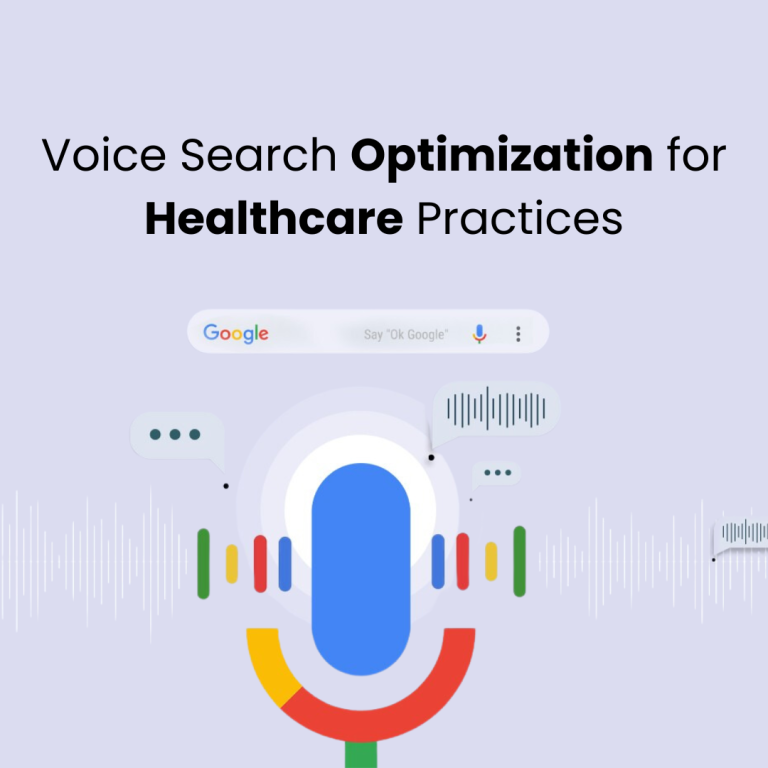
Are you ready to upgrade your healthcare practice to the next level? Today, voice search is revolutionizing the way people find information. Patients are asking questions and seeking care with simple voice commands, and if your practice isn’t optimized for this trend, you’re missing out on a growing number of potential patients.
This blog dives into the essentials of voice search optimization—why it matters, the benefits it brings, effective strategies to implement, and how to stay ahead in this ever-evolving digital landscape. Ready to connect with patients in a more natural, intuitive way? Let’s get started!
What is Voice Search Optimization?
Voice search optimization refers to the process of making your content more accessible and discoverable through voice-activated search queries. Unlike traditional text-based searches, voice searches are conversational and typically longer. For example, instead of typing “best pediatrician near me,” a user might ask, “Who is the best pediatrician near me?”
Voice search optimization focuses on understanding and adapting to these natural language queries. It involves fine-tuning your website, content, and SEO strategies to meet the demands of voice search engines like Google Assistant, Siri, Alexa, and Cortana.
The Importance of Voice Search Optimization in Healthcare
The healthcare industry is unique in that it deals with some of the most important aspects of people’s lives, health, and well-being. Patients often seek quick and reliable information about symptoms, treatments, and healthcare providers. With the increasing use of voice-activated devices, optimizing for voice search can significantly enhance the way patients find and interact with your practice.
Considering recent studies, nearly 55% of households are expected to have a smart speaker by 2025. This means more and more people will rely on voice search to make informed decisions about their healthcare. If your practice is not optimized for voice search, you risk losing visibility and potential patients to better-prepared competitors.
Key Benefits of Voice Search Optimization for Healthcare Practices
Voice search optimization isn’t just a trend, it’s a strategic move that offers numerous benefits:
-
- Enhanced Patient Engagement: Voice search allows for more personalized and conversational interaction with potential patients, fostering better engagement.
-
- Improved Local SEO: Voice searches are often locally focused. Optimizing for voice can boost your local SEO, making it easier for nearby patients to find your practice.
-
- Higher Search Rankings: Google prioritizes websites that are optimized for voice search, leading to higher search engine rankings.
-
- Increased Patient Trust: By providing quick and accurate information through voice search, you can build trust and credibility with your patients.
-
- Better Accessibility: Voice search makes it easier for people with disabilities or those who are not tech-savvy to access healthcare information.
Strategies for Voice Search Optimization in Healthcare
To fully leverage the potential of voice search, healthcare practices need to adopt targeted strategies. Here are some actionable steps:
-
- Focus on Conversational Keywords: Voice searches are conversational. Incorporate long-tail keywords and phrases that mimic how people speak. For instance, instead of targeting “pediatric care,” consider optimizing for “Where can I find pediatric care near me?”
-
- Optimize for Local Search: Ensure that your practice’s name, address, and phone number (NAP) are consistent across all platforms. Register with Google My Business and other local directories to improve your chances of appearing in local voice search results.
-
- Create FAQ Pages: Since voice search queries are often in the form of questions, having a comprehensive FAQ page can greatly enhance your visibility. Make sure your FAQ answers are concise and directly address common patient queries.
-
- Improve Page Load Speed: Voice search users expect quick results. A slow-loading website can lead to higher bounce rates and lower rankings. Use tools like Google PageSpeed Insights to analyze and optimize your site’s load time.
-
- Ensure Mobile Optimization: Most voice searches are conducted on mobile devices. A mobile-friendly website is essential for capturing and retaining voice search traffic. Use responsive design and ensure your site is easy to navigate on smaller screens.
-
- Use Structured Data: Implement schema markup to help search engines better understand the content on your website. Structured data can increase your chances of appearing in rich snippets, which are often read aloud by voice search assistants.
-
- Optimize Content for Featured Snippets: Aim to create content that answers specific questions succinctly. Google often pulls content from featured snippets to answer voice search queries, so positioning your content for these snippets can significantly boost your visibility.
Conclusion
Voice Search Optimization is not just the future of search, it’s the present. For healthcare practices, optimizing for voice search is essential to stay competitive, improve patient engagement, and increase visibility.
By focusing on conversational keywords, improving local SEO, and creating content tailored to voice queries, you can ensure your practice is easily discoverable by the growing number of patients using voice search.
The digital landscape is constantly evolving, and staying ahead requires a proactive approach. Implement the strategies outlined in this guide to future-proof your healthcare practice and connect with patients in a more meaningful way. With voice search optimization, you’re not just improving your online presence, you’re enhancing the patient experience.



